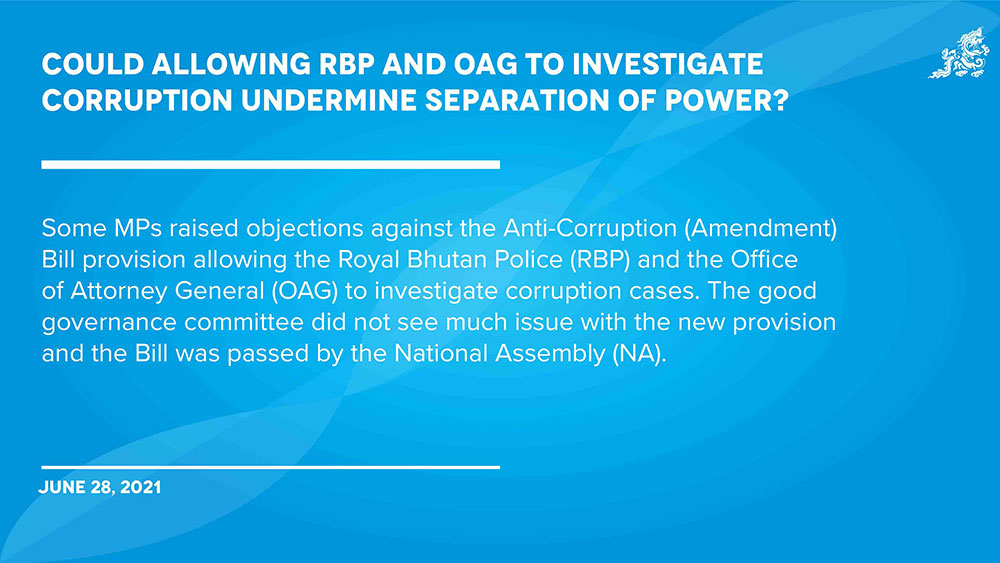MB Subba
The National Assembly passed the Anti-Corruption (Amendment) Bill with a contentious provision which allows the Royal Bhutan Police (RBP) and the Office of Attorney General (OAG) to investigate corruption cases.
The Bill initially did not have the provision but it was incorporated under Section 119 by the good governance committee of the House to address the shortage of human resources in the Anti-Corruption Commission (ACC).
Members who supported the provision justified that the OAG and RBP would investigate corruption cases only if the ACC authorises the two institutions to do so. The officials will enjoy immunity like investigators of the ACC.
However, some of the MPs raised objections against the provision, saying that it was not appropriate for the RBP and OAG to investigate corruption cases, as each of the institutions’ mandates were different.
Opposition Leader (OL) Dorji Wangdi said that the provision violated the very principle of the separation of power, authority and accountability. Such decisions, he said, would institutionalise wrong precedents.
He said that the provision was against the Constitution, which separates the mandates of institutions.
“While the RBP’s mandate is to protect the law and prevent crimes, the OAG is responsible for prosecution, and the ACC’s mandate is to investigate corruption,” Dorji Wangdi said.
Bongo Chapcha MP Tshewang Lhamo said that investigation of corruption was the mandate of ACC. She said that there would be no issues in the future if the responsibilities of institutions were separated as per the Constitution.
Prime Minister Lotay Tshering, however, said the provision was not unconstitutional. “It depends on how one interprets. The two institutions would do that (investigate corruption) only on the request of ACC,” he said.
According to the good governance committee’s chairperson, Ugyen Dorji, the committee had talked with the ACC to seek their views on the issue.
The committee did not see much issue with the new provision.
The Bill was passed with 35 Yes votes, two No votes, while three abstained out of the total of 40 Members present and voting on June 7.
The Bill will be referred to the National Council.
The Bill covers protection of witnesses, liability of legal persons and suspension of public servants, among others.
As per the review report of the ACC Report 2019, the ACC had a very challenging mandate, professionally due to the complexity of corruption dynamics and socially having to operate in a small and very close-knit society.
“The verbal and physical abuses and threats by the affected individuals to the ACC staff have increased over the years and in the reporting year the ACC encountered yet another major incidence where its investigators were abused in the line of duty by the clients related to a case,” it stated.
According to the report, although the government has allocated adequate budget for the implementation of plans and programmes in the 12th Plan, the commission has been exploring financial support from development partners to supplement the government’s contributions.
Edited by Jigme Wangchuk


